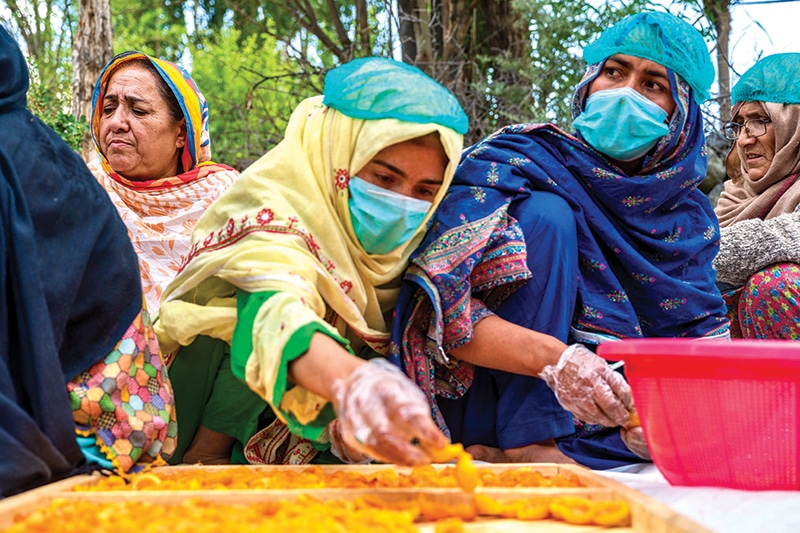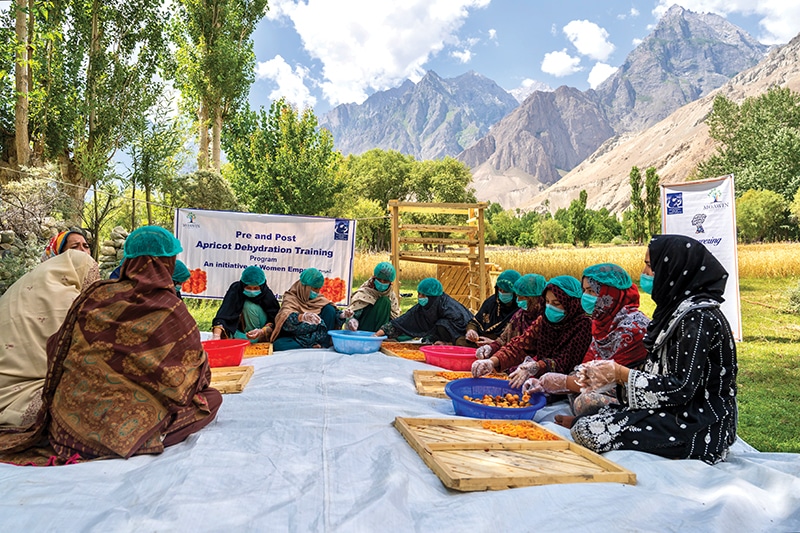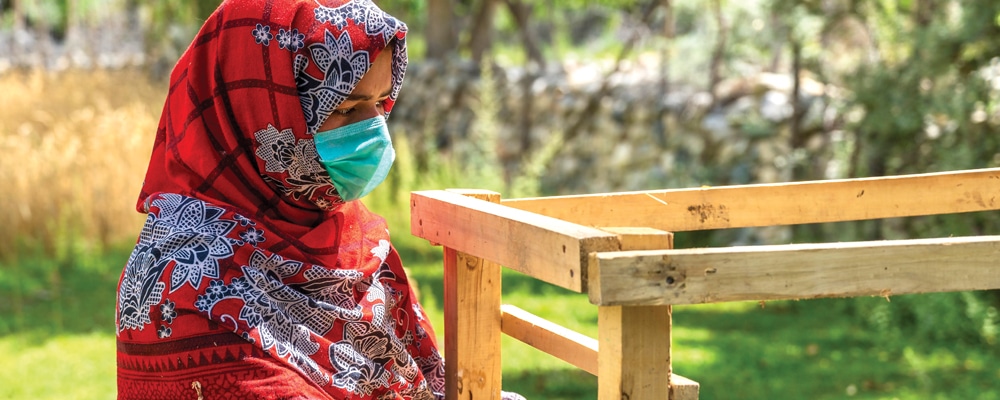By Rida
Pakistan ranks 143rd out of 146 countries in achieving economic participation and opportunities for women in the 2024 Women’s Economic Gap Index.i This places Pakistan among the most challenging environments globally for women seeking economic empowerment. Despite comprising nearly half of Pakistan’s population at 48.76%, women are significantly underrepresented in the labor force, with only 25% actively engaged in economic activities. The situation is especially challenging for women in rural areas who lack the education and skills to access higher paid jobs.
Amidst these challenges, a significant transformation is underway in the apricot orchards of the remote, high-mountain region of Gilgit-Baltistan, Pakistan where Central Asia Institute has long worked. Despite women’s role in fruit harvesting, approximately 45% of the annual apricot harvest is lost due to insufficient agricultural education, inefficient preservation methods, and limited access to markets and training centers. Consequently, women face profound economic insecurity and lack of empowerment. To address these issues, CAI partnered with Moawin Foundation to launch the Women’s Fruit Dehydration program.
Through targeted training, nearly 100 participants from five districts in Gilgit-Baltistan were introduced to improved fruit processing techniques to enhance the quality of dried apricots — a staple of the national economy. As a result, traditional dehydration methods were modernized enabling women to dry fruit in just three to four days compared to the previous two to three weeks. According to Mr. Wahli, Moawin Foundation’s Regional Manager: “The introduction of modern techniques has been transformative for the village women. They now have access to efficient practices that allow them to preserve a greater portion of their harvest which helped them transition from merely subsisting on their produce to generating substantial income. This empowerment has given them greater control over their finances, enabling them to invest in their families’ health, education, and future. The program has also stimulated economic activity within the communities.”

Before the program, a portion of the participants’ harvest went towards feeding families and cattle, while the remainder was discarded, resulting in both economic and environmental losses. Since its implementation, the program’s economic impact on women’s households is already promising to be transformative. Previously, these households earned approximately $70-$90 per month; now, they are projected to earn between $170-$220 per month — a potential income increase of up to 140%. Whereas their produce once sold for around 20 cents per kilogram, they now command prices between 82 cents to $1 per kilogram. This represents more than a 400% increase in profit.
Rashida, 43 years old and a single parent of three, used to depend solely on sporadic agricultural earnings. Her life changed when she joined the program. Equipped with new knowledge, she now dreams of expanding her operations to international markets. “Thank you to the donors for choosing a region where the common perception was that women couldn’t achieve much,” Rashida expressed gratefully. “Your support has shattered those misconceptions and empowered us to showcase our capabilities. Your investment has not only changed our lives but also inspired a new narrative of possibility for future generations. Thank you for believing in us.”
These women have not only brought financial prosperity to their households, but also discovered a sense of accomplishment. Faiza, 35 years old and from a family of eight with no formal education or prior work experience, shared, “What makes me incredibly happy is knowing that I am now recognized as a skilled individual. I no longer have to depend solely on my husband for every financial need. This independence gives me confidence and has empowered me to believe that I, too, can make a significant contribution.”
The success experienced by Rashida, Faiza, and other women participants has also changed their perspectives. Instead of envisioning a future devoid of opportunities, they now feel hopeful and excited about expanding their operations to new markets. Their achievements are also resonating beyond their immediate circle. As word of their success spreads, it has inspired women in other communities. “So many of my neighbors visit me to witness [fruit processing] demonstrations and express their eagerness to join the program. In the future, I want to become a trainer myself to empower other women,” said Rashida. This ripple effect is also impacting future generations. Children, especially girls, are witnessing their mothers break down gender stereotypes and become principal breadwinners.
All in all, it’s not just about the fruits they harvest; it’s about planting seeds of change for generations to come.

Rida is a Fulbright Scholar from Pakistan pursuing International Development Studies at Ohio University. She spent the summer of 2024 working as an intern with Central Asia Institute.
All photos in this articleprovided by Yawar Talib
iWorld Economic Forum, “Global Gender Gap 2024 Insight Report,” June 2024. https://www.weforum.org/publications/global-gender-gap-report-2024/

